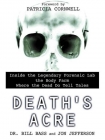Death's Acre: Inside The Legendary Forensic Lab The Body Farm Bill Bass (howl and other poems TXT) 📖

- Author: Bill Bass
Book online «Death's Acre: Inside The Legendary Forensic Lab The Body Farm Bill Bass (howl and other poems TXT) 📖». Author Bill Bass
I remember taking about two bites of the potato. Suddenly things began to go black. Pushing my plate to one side, I told Carol, “I’m about to pass out”; with that, my head dropped to the table. I have no recollection of the events that followed; I relate them as they were recounted to me by Carol and others.
Paramedics soon arrived and so did Dr. Sullivan Smith, the county’s medical examiner, who had been driving nearby when the 911 call came. Hearing the emergency dispatcher on the police radio in his car, he hotfooted it to Logan’s. If he’d arrived a minute later, he might have had occasion to document my death. As it was, he joined the fight to reverse it.
I’d known Dr. Smith for years, ever since his medical residency at UT Medical Center in Knoxville. I consider him one of the state’s best medical examiners, and over the years I’ve lectured half a dozen times or more for his seminars for ER personnel. Amazingly, Dr. Smith recognized me from a glance at the back of my head. (I’m not sure whether that says more about the keenness of his mind or the strangeness of my head.)
“Dr. Bass? Dr. Bass, can you hear me?” he asked, then looked at the paramedic who was still checking for a pulse. The paramedic just shook his head. “Dr. Bass, we’re going to have to move you to the floor right now,” Smith said, as if I could hear.
They unpacked their portable defibrillator, brought the paddles to my chest, and prepared to give me a jolt of electricity—a final, desperate effort to jump-start my heart. Just at that moment my heart shuddered back to life. Consciousness and vision returned, and I found myself lying on the floor, surrounded by feet—dozens of feet.
“Dr. Bass, can you hear me?” The voice was vaguely familiar; so was the face of the man kneeling over me. “ . . . Sullivan Smith,” he seemed to be saying.
“Sullivan Smith? Oh, yes, I know him,” I murmured weakly. “I’ve lectured for him.”
“No, Dr. Bass, this is Sullivan Smith,” he said. Finally the fog cleared and I recognized him, grateful to be in such good hands. Another minute or so, Smith said, and they might not have been able to bring me back.
Within hours Smith arranged for an ambulance to transfer me to UT Hospital in Knoxville. The EMT and I chatted for most of the two-hour ride, about subjects ranging from forensic cases to UT football. One thing we did not talk about was my near miss with death.
My cardiologist, John Acker, said my heart muscle itself was fine. The problem was in the electrical system controlling its contractions. Fortunately, the fix was simple: a pacemaker, a sophisticated heart monitor and miniature defibrillator packed into a disk not much bigger than a silver dollar. If my heart was working fine, the pacemaker would do nothing; however, if my heart rate dropped below fifty beats per minute, the pacemaker would kick in.
It was an odd feeling to be in UT Hospital as a patient. I’ve spent thousands of hours there since moving to Knoxville in 1971: The Knox County Morgue and the Regional Forensic Center are housed in the hospital, and I’ve examined hundreds of bodies and skeletons there. The fact that I myself now had one foot on the edge of the grave made me all too aware of the proximity of those basement autopsy rooms. A few days later I had surgery to implant the pacemaker.
ONCE UPON A TIME I believed in an afterlife. I believed in it for fully sixty years after my father shot himself. But then Ann died, and then Annette died, and suddenly nothing I’d grown up believing about God and heaven made any sense to me any longer. We’re organisms; we’re conceived, we’re born, we live, we die, and we decay. But as we decay we feed the world of the living: plants and bugs and bacteria.
People who knew my father—the man I never got a chance to know; the man who eluded me when I was three—say I resemble him in many ways: in my curiosity and intelligence, my friendliness, my kindness; in the way I stick out my tongue slightly when I’m concentrating hard. I’m proud to see these same qualities in my grown sons, and I notice with delight that one of my granddaughters, when she’s coloring or practicing the knitting stitches Carol has taught her, sticks out her tongue in that distinctive Bass manner. So something of us lives on, in some fashion, in those we leave behind us: our genes, our mannerisms, our shared experiences and oral histories.
Is that all that endures? Almost, I think, but not quite. Charlie Snow, who brought me in on my first forensic case—that woman’s soggy, burned body we exhumed and identified outside Lexington—is still alive to me in a way when I arrive at a crime scene and begin trying to make sense of what I see and what I smell. So is Wilton Krogman, the Socrates of “bone men”: there’s a part of me that’s forever in a car with him, perpetually commuting to the University of Pennsylvania; in my mind I go over my latest case with him, outlining my conclusions and marshaling my arguments and references to answer any question and refute any objection the great man might voice. I still beam with pride, after all these years, when I spot something Krogman might have overlooked if he had been on the case.
And so it





Comments (0)